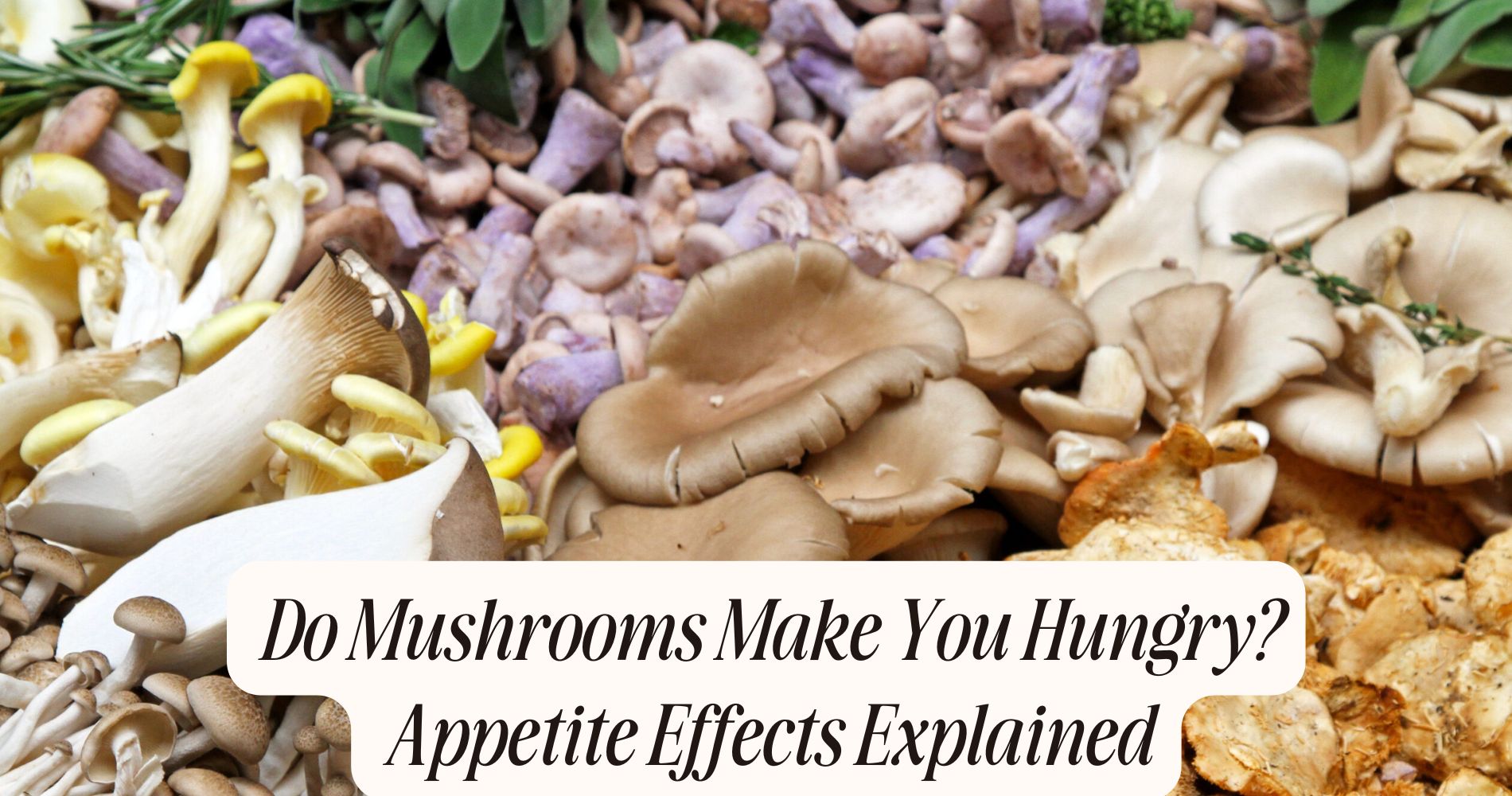
Do Mushrooms Make You Hungry? Appetite Effects Explained
Do mushrooms make you hungry? Mushrooms often appear in various diets, but do they really affect your hunger levels? Contrary to popular belief, they don't inherently stimulate appetite. Instead, their high fiber content may promote feelings of fullness, potentially aiding in calorie control. Additionally, certain compounds in mushrooms might interact with appetite-regulating hormones. Understanding these effects can influence how you incorporate mushrooms into your meals. But what implications does this have for your overall eating habits?
Understanding Appetite Regulation
Understanding appetite regulation is essential for grasping how various factors, including diet, influence our eating behaviors. Your body relies on a complex interplay of hunger signals and appetite hormones to determine when and how much to eat.
Hormones like ghrelin, which increases appetite, and leptin, which signals satiety, play significant roles in this process. When your stomach is empty, ghrelin levels rise, sending strong hunger signals to your brain. Conversely, as you consume food, leptin levels increase, helping you feel full.
Various dietary components can impact these hormones, ultimately affecting your appetite. By understanding how these mechanisms work, you can make informed dietary choices that align with your hunger cues and overall health goals.
Nutritional Profile of Mushrooms
Mushrooms are a nutrient-dense food that offers a variety of health benefits. They’re low in calories yet packed with essential vitamins and minerals, including B vitamins, selenium, and potassium.
Their high fiber content supports digestive health, while antioxidants help combat oxidative stress. This combination of nutrients not only promotes overall well-being but also enhances satiety, potentially influencing appetite regulation.

Additionally, mushrooms are celebrated for their culinary versatility; they can be easily incorporated into various dishes, from salads to stir-fries. This adaptability makes them a valuable ingredient for anyone seeking to improve their diet.
Types of Mushrooms and Their Effects
Various types of mushrooms offer distinct effects on health and appetite regulation.
Medicinal mushrooms, like reishi and lion's mane, have been shown to enhance cognitive function and boost immunity, which may indirectly influence your appetite by improving overall well-being.
On the other hand, edible varieties such as shiitake and portobello provide essential nutrients and can promote satiety due to their high water and fiber content. This satiety may help regulate your hunger levels, potentially reducing overeating.

Some studies suggest that certain mushrooms might interact with your body’s metabolic processes, impacting hunger hormones.
Consequently, understanding the varied effects of these mushrooms can help you make informed choices about their incorporation into your diet, whether for health benefits or appetite management.
The Role of Fiber in Mushrooms
While many people associate fiber primarily with fruits and vegetables, mushrooms also play a significant role in providing this essential nutrient.
As a lesser-known fiber source, mushrooms contain both soluble and insoluble fiber, which contributes to digestive benefits. Soluble fiber can help regulate blood sugar levels and slow digestion, while insoluble fiber promotes regular bowel movements.
Including mushrooms in your diet can enhance gut health and improve overall digestive function. Studies show that a high-fiber diet, including mushrooms, may reduce the risk of gastrointestinal disorders and promote a feeling of fullness.
Mushrooms and Satiety Hormones
When you consume mushrooms, you might be influencing your body's production of satiety hormones, which play a key role in regulating hunger and fullness.
Research suggests that mushrooms may enhance the release of specific satiety signals, such as leptin and peptide YY, which help communicate to your brain that you're full. These hormone interactions could lead to reduced appetite and lower overall calorie intake.

Additionally, the presence of certain nutrients in mushrooms, like fiber and protein, may further support the regulation of these hormones, promoting a feeling of satisfaction.
Research Studies on Mushrooms and Appetite
Research into the impact of mushrooms on appetite reveals promising insights into their role in dietary regulation. Various studies have examined different mushroom types, such as shiitake and oyster mushrooms, and their effects on appetite responses.
These investigations often measure changes in hunger hormones and other physiological markers after consumption. Results indicate that certain mushroom varieties may enhance feelings of fullness, potentially due to their high fiber content and low-calorie nature.
Additionally, some research suggests that the presence of bioactive compounds in mushrooms could influence appetite regulation positively. By understanding the relationship between specific mushroom types and appetite responses, you can make more informed dietary choices that support your health and wellness goals.
Culinary Uses of Mushrooms for Hunger Management
Mushrooms serve as versatile ingredients in various culinary applications, making them effective tools for managing hunger. Their unique flavor profiles range from earthy to umami, enhancing dishes while providing low-calorie bulk.
You can explore numerous mushroom recipes that incorporate them into soups, stir-fries, and salads, contributing to a feeling of fullness without excess calories. The high fiber content in mushrooms promotes satiety, making it easier to control portion sizes.

Additionally, their adaptability allows you to pair them with various spices and other ingredients, ensuring that meals remain satisfying and enjoyable. By incorporating mushrooms into your meals, you not only diversify your diet but also leverage their hunger-managing properties, supporting your overall wellness goals.
Incorporating Mushrooms Into Your Diet
Incorporating mushrooms into your diet can enhance both flavor and nutritional value, making meals more satisfying. Rich in vitamins, minerals, and antioxidants, mushrooms offer significant dietary benefits, including potential weight management and improved immune function.
You can easily include them in various dishes. For example, try sautéing mushrooms with garlic and herbs as a side dish or adding them to stir-fries and salads for extra texture. There are countless mushroom recipes available, from creamy risottos to hearty soups, allowing you to explore numerous culinary possibilities.
Additionally, mushrooms are low in calories and high in fiber, promoting satiety. By making mushrooms a staple in your meals, you'll not only elevate your dishes but also support your overall health.
Easy Energy, Anytime
Looking for a simple way to enjoy the benefits of mushrooms without the prep? Try SUPER MUSHROOM GUMMIES by Well Gummies. Packed with 10 powerful functional mushrooms, these tasty chewables support focus, calm energy, and immune balance—all in one convenient bite. With a fresh wild berry flavor and zero crash, they’re a delicious daily habit that works as hard as you do.
Frequently Asked Questions
Can Mushrooms Replace Meat in a Hunger-Satisfying Diet?
Mushrooms can effectively replace meat in a hunger-satisfying diet due to their rich mushroom nutrition and umami flavor. As meat alternatives, they provide essential nutrients, fiber, and satiety, helping you maintain balanced meals.
Are There Any Side Effects of Eating Too Many Mushrooms?
Eating too many mushrooms can lead to mushroom toxicity, which may cause gastrointestinal issues. Additionally, excessive consumption can interfere with nutrient absorption, potentially affecting your overall health and nutritional balance. Moderation is key.
Do Mushrooms Have Any Mood-Enhancing Properties Related to Appetite?
Mushroom compounds can influence mood regulation, potentially impacting appetite indirectly. While research on this link is limited, some studies suggest certain mushrooms might enhance mood, which could lead to changes in your appetite patterns.
Can Mushroom Consumption Help With Weight Loss Goals?
Mushroom consumption can support weight loss goals due to various mushroom varieties being low in calorie content. Their nutrient density helps you feel full longer, potentially reducing overall calorie intake while promoting healthier eating habits.
Are There Specific Mushrooms That Boost Metabolism?
Certain specific varieties of mushrooms, like shiitake and maitake, contain compounds that may act as metabolism boosters. Research suggests they can enhance fat oxidation, potentially supporting your weight management and metabolic health goals effectively.
Conclusion
To sum up, mushrooms don’t inherently stimulate hunger; instead, their high fiber content and nutrient density support appetite regulation. By promoting satiety and potentially influencing hunger hormones, mushrooms can play a beneficial role in your diet. Incorporating various types of mushrooms into your meals not only enhances flavor but also aids in managing calorie intake. With their numerous health benefits, mushrooms are an excellent choice for anyone looking to maintain a balanced diet and healthy eating habits.




